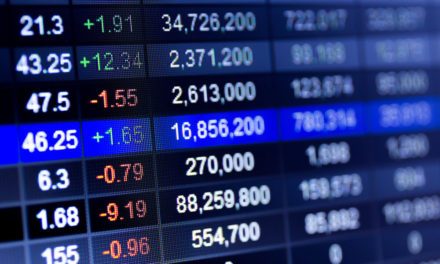Global stocks took small losses Monday after China reportedly pulled out of trade talks with the U.S. Industrial companies and banks suffered some of the worst declines among American stocks.
The U.S. and China officially began taxing larger amounts of each other’s goods Monday, and the Wall Street Journal reported that China pulled out of talks that could have led to a new round of negotiations to end the trade war.
The U.S. is now taxing another $200 billion in Chinese imports at a rate of 10 percent, and China added taxes of 5 to 10 percent on $60 billion in U.S. products. Oil prices jumped after OPEC decided not to produce more oil.
Technology and health care companies rose, leaving U.S. indexes only slightly lower.
“The market’s been remarkably resilient over the last couple of months while trade tensions were heating up,” said Terry Sandven, chief equity strategist at U.S. Bank Wealth Management.
Sandven said the trade spat will endure past the midterm elections in November, but stocks are likely to keep rising because of strong earnings growth for U.S. companies, combined with low inflation and low interest rates.
KEEPING SCORE:
The S&P 500 index fell 10.30 points, or 0.4 percent, to 2,919.37. The Dow Jones Industrial Average lost 181.45 points, or 0.7 percent, to 26,562.05. Both the S&P 500 and Dow set record highs last week.
The Russell 2000 index of smaller-company stocks dropped 7 points, or 0.4 percent, to 1,705.32. The Nasdaq composite rose 6.29 points, or 0.1 percent, to 7,993.25.
CHINA-US TRADE: The U.S. and China recently discussed another meeting to work on their trade dispute, but the Wall Street Journal reported that China pulled out of those talks.
In an escalation of their trade spat, the U.S. is now taxing another $200 billion in Chinese imports at a rate of 10 percent, and China added taxes of 5 to 10 percent on $60 billion in U.S. products.
In the U.S., industrial and basic materials companies sank. General Electric fell 4.1 percent to $11.68 and DowDuPont shed 2.1 percent to $68.26.
Overseas, Germany’s DAX fell 0.6 percent and the CAC 40 in France lost 0.3 percent. The FTSE 100 in Britain dipped 0.4 percent. Hong Kong’s Hang Seng index fell 1.6 percent and India’s Sensex gave up 1.5 percent. Markets in Japan and South Korea were closed for national holidays.
THE QUOTE: Terry Sandven, chief equity strategist at U.S. Bank Wealth Management, said the trade tensions won’t end soon, but stocks are likely to keep rising because of strong earnings growth for U.S. companies, combined with low inflation and low interest rates.
“The market’s been remarkably resilient over the last couple of months while trade tensions were heating up,” he said.
Sandven noted that a lot of this year’s stock gains have been concentrated in technology, retail and health care companies, and it will be a positive for the market if other sectors do better.
CHANNEL CHANGER: Late Friday Comcast won an auction for majority control of British pay TV giant Sky. Its final offer was worth about $39 billion and topped an offer from Twenty-First Century Fox, which is already a major Sky shareholder. Both sought to establish a foothold in Europe.
In London, Sky shares jumped 8.6 percent. Comcast sank 6.3 percent to $35.50, while Fox rose 1.5 percent to $44.98. Disney, which is buying Fox, climbed 2.1 percent to $112.71.
ENERGY: OPEC and key allies like Russia decided not to increase their oil output further. Production is falling in some OPEC nations, including Iran, which faces new sanctions from the U.S. Benchmark U.S. crude gained 1.8 percent to $72.08 a barrel in New York while Brent crude, the international standard for oil prices, rose 3 percent to $81.20 a barrel in London, its highest price in more than three years.
Airlines and other transportation companies fell as investors anticipated they will have to pay higher prices for fuel.
BOOMBOX: Subscription radio company Sirius XM says it’s buying music streaming service Pandora Media. The deal will expand its service beyond cars and into homes and other areas. The companies valued the deal at about $3.5 billion in stock.
Pandora edged up 0.3 percent to $9.12 while Sirius fell 8.8 percent to $6.37.
STRIKING GOLD: Barrick Gold will buy competitor Randgold Resources for $6.1 billion in stock to create the world’s largest gold miner. The merged company will combine Randgold’s African mines with Barrick’s holdings in the Americas.
Barrick rose 6.5 percent to $11.15 and Randgold gained 7.5 percent to $68.70.
DONATELLA-ME IT’S A DONE DEAL: An Italian newspaper reports that the Versace group is on the verge of announcing its sale, and Bloomberg and Reuters reported that luxury fashion and handbag maker Michael Kors is the buyer. The Italian publication, Corriere della Sella, said the deal is worth 2 billion euros ($2.4 billion).
Michael Kors stock skidded 7.6 percent to $67.26.
HIGHS AND LOWS: Marijuana growers continued to make dramatic moves. Biotechnology company Intrexon soared 35.9 percent to $19.71 in heavy trading after it said it engineered a strain of yeast to produce chemical compounds found in marijuana consistently and at low cost. That’s been a problem in researching the drug.
Canadian medical marijuana company Tilray sank 16.2 percent to $103.11. It’s on track for its third consecutive big loss, but before that, its value nearly tripled over the course of a week and a half.
BONDS: Bond prices fell. The yield on the 10-year Treasury note rose to 3.09 percent from 3.06 percent.
OTHER COMMODITIES: Wholesale gasoline rose 1.9 percent to $2.05 a gallon. Heating oil added 2.7 percent to $2.29 a gallon. Natural gas gained 2 percent to $3.04 per 1,000 cubic feet.
Gold added 0.3 percent to $1,204.40 an ounce. Silver lost 0.1 percent to $14.34 an ounce. Copper fell 0.8 percent to $2.84 a pound.
CURRENCIES: The dollar rose to 112.73 yen from 112.52 yen. The euro edged up to $1.1758 from $1.1747.
© The Associated Press. All rights reserved.




